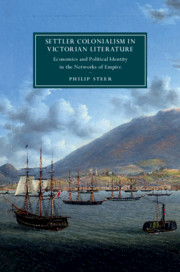 Settler Colonialism in Victorian Literature
Settler Colonialism in Victorian Literature Colonial Progress, Debt, and Greater Britain
Published online by Cambridge University Press: 19 December 2019
This chapter argues that a formal logic of “speculative utopianism” emerged in New Zealand by the 1870s, linking the idea of the settler colony as the future of British identity with the promise that it would reward metropolitan financial investment. The emergence of this logic can be seen in Samuel Butler’s First Year in Canterbury Settlement (1863) and Erewhon (1872), which formalize the association between culture, investment, and settler futurity. The stakes of speculative utopianism were intensified as the colony acquired unprecedented levels of debt, the outcome of a policy to spur development that colonial premier Julius Vogel grounded in claims about the colony’s future potential as an ideal British society. The collapse of New Zealand’s credit led metropolitan writers to attack the assumptions of speculative utopianism, most notably in Trollope’s dystopian The Fixed Period (1882). Two fin de siècle works of speculative utopianism—Vogel’s Anno Domini 2000 (1889) and H. C. Marriott Watson’s Decline and Fall of the British Empire (1890)—reveal a further shift in the status of the settler empire, as the future value of the settler population is now cast in geopolitical terms.
To save this book to your Kindle, first ensure [email protected] is added to your Approved Personal Document E-mail List under your Personal Document Settings on the Manage Your Content and Devices page of your Amazon account. Then enter the ‘name’ part of your Kindle email address below. Find out more about saving to your Kindle.
Note you can select to save to either the @free.kindle.com or @kindle.com variations. ‘@free.kindle.com’ emails are free but can only be saved to your device when it is connected to wi-fi. ‘@kindle.com’ emails can be delivered even when you are not connected to wi-fi, but note that service fees apply.
Find out more about the Kindle Personal Document Service.
To save content items to your account, please confirm that you agree to abide by our usage policies. If this is the first time you use this feature, you will be asked to authorise Cambridge Core to connect with your account. Find out more about saving content to Dropbox.
To save content items to your account, please confirm that you agree to abide by our usage policies. If this is the first time you use this feature, you will be asked to authorise Cambridge Core to connect with your account. Find out more about saving content to Google Drive.